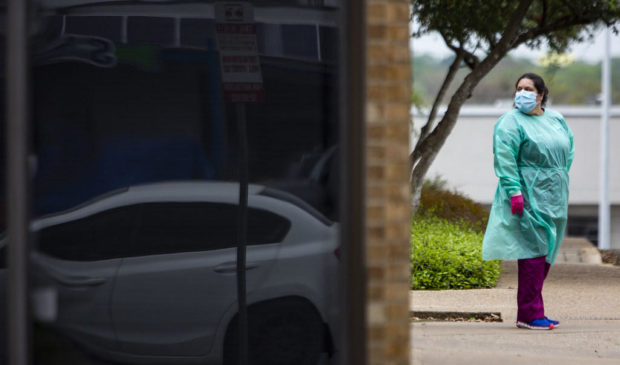Newsletter Signup
The Austin Monitor thanks its sponsors. Become one.
Most Popular Stories
- Austin opens new affordable housing development in Southeast Austin
- Landmark commission says goodbye to Nau’s Enfield Drug
- Congress Avenue transformation plan gets support from Urban Transportation Commission
- After a decline last year, Travis County homeowners should expect a return to rising property taxes
- ZAP Commission forwards recommendation allowing some commercial uses in residential zones
-
Discover News By District

Photo by Gabriel C. Pérez/KUT
Austin officials plan for backup facilities if hospitals become overwhelmed with Covid-19 cases
Thursday, April 9, 2020 by Ashley Lopez, KUT
City officials are preparing to increase the number of hospital beds in the area in case there is a surge of Covid-19 patients overwhelming existing hospitals.
Dr. Mark Escott, Austin’s interim medical director and health authority, said the city has created a “surge plan” that would include creating additional facilities to treat patients.
Everyone who requires medical attention during the pandemic should get the care they need, he said.
“While most of these cases are mild, it is critical that you not wait until when it gets worse,” he said. “It is critical that you seek out medical care.”
Watch the city’s press conference below (it starts at the 8-minute mark).
According to the city, the Austin-Travis County area currently has about 4,300 hospital beds. Hospitals are operating at about 50 percent capacity.
In the event there is an influx of patients with Covid-19 who need medical attention, the city has identified two kinds of what officials call “alternative care sites” that will function as temporary hospitals.
Escott said six facilities have been identified as type 2, which are largely outpatient facilities or former hospitals that can be used for a smaller number of patients. If those facilities run out of beds, patients will go to a type 1 facility, which is a large venue that can look after 100 to 1,000 patients at a time. City officials said they have found one venue to serve as a type 1 facility.
Whether the city will need to scale up depends on whether the city is able to curb the number of new Covid-19 cases. Travis County Judge Sarah Eckhardt said the city has decreased nonessential activity by about 64 percent, which will help prevent hospitals from getting overwhelmed.
“But I think we could do even better,” she said.
Eckhardt said Austin has also significantly ramped up testing, though there’s still not enough yet.
Escott said the city is already providing lodging in hotels for those who have tested positive for Covid-19 and want to stay away from their families to avoid infecting them.
“The more people we can get to move to these facilities … the better chance we have of decreasing the chance of infection in the household,” he said.
The city has also set up what it calls “protective lodges” for people who are at high risk of complications if they get sick, including those experiencing homelessness.
When asked if there are plans for the city’s homeless population after this crisis, Austin Mayor Steve Adler said he hopes the city will “take advantage” of what it’s learning right now.
“That’s a challenge that this community has had for a long time,” he said. “My hope really is that on the back end of the virus issue, we will have taken some real significant steps toward better taking care of this part of our community.”
Eckhardt said there is a task force making sure there is enough personal protective equipment like face masks and gowns for medical professionals as they scale up. She said whether the city ultimately has enough protective gear and ventilators depends on whether the community can curb the spread of the virus.
“It will take our combined efforts,” she said.
This story was produced as part of the Austin Monitor’s reporting partnership with KUT.
The Austin Monitor’s work is made possible by donations from the community. Though our reporting covers donors from time to time, we are careful to keep business and editorial efforts separate while maintaining transparency. A complete list of donors is available here, and our code of ethics is explained here.
You're a community leader
And we’re honored you look to us for serious, in-depth news. You know a strong community needs local and dedicated watchdog reporting. We’re here for you and that won’t change. Now will you take the powerful next step and support our nonprofit news organization?








